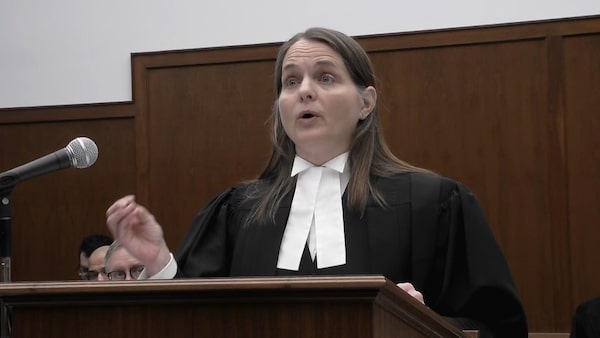
Federal lawyer Sharlene Telles-Langdon, seen here on Feb. 14, 2019, told Alberta’s Court of Appeal that a carbon tax is a proven tool to curb greenhouse gas emissions and reduce the effects of climate change.The Canadian Press
Climate change represents an existential threat that demands a national response, the federal government told Alberta’s highest court on Tuesday as Ottawa defended its carbon tax from the latest challenge from a conservative province.
Federal lawyer Sharlene Telles-Langdon told Alberta’s Court of Appeal that a carbon tax is a proven tool to curb greenhouse gas emissions and reduce the effects of climate change. For that to work, she said, it must apply across the country in a way that provides an incentive for consumers to reduce their environmental burden.
“The context of this case is one of the greatest existential issues of our time," she said. “It is undisputed that climate change is an urgent threat to humanity. Greenhouse gas emissions are not contained within geographic boundaries."
The Alberta constitutional case, which was a central campaign promise from now-Premier Jason Kenney in the province’s spring election, follows similar challenges in Saskatchewan and Ontario. Both of those cases upheld the federal system with split decisions, and all three are expected to be heard by the Supreme Court of Canada in March.
Ottawa began imposing its carbon tax this year on provinces that did not have their own systems in place. Alberta, which had a consumer carbon tax until Mr. Kenney’s government repealed it soon after taking office, is set to fall under the federal tax on Jan. 1; the continuing court challenge won’t change that.
An Alberta government lawyer argued on Monday that the carbon tax should be thrown out because it intrudes on issues of provincial jurisdiction and threatens to infringe on the daily lives of citizens.
But Ms. Telles-Langdon argued that the carbon-pricing system is constitutional because climate change is an issue of national concern, which allows the federal government to set minimum standards to regulate emissions. She said the federal system is nevertheless designed to be flexible, allowing provinces to create their own systems to fit their individual circumstances, so long as they meet a series of federal requirements.
She also noted that the federal government returns carbon tax revenue through rebates, which leaves many Canadians better off, particularly if they are taking steps to reduce their carbon footprint – and, in turn, reduce the amount of tax they pay.
“The carbon charge is visible, so it makes people think, ‘When I buy a new vehicle, maybe I won’t buy an F-350 [pickup], maybe I’ll buy an F-150. Or I’ll switch to something that’s even more efficient,’ ” she said.
“There are changes that individuals can make.”
Alberta’s United Conservative Party government came to power on a platform that opposed what Mr. Kenney described as “job-killing" carbon taxes on consumers. His government has instead focused on targeting industrial facilities with a tax that will be used, in part, to fund technology designed to reduce emissions.
The federal government recently approved of Alberta’s industrial carbon tax, which will be $30 a tonne when it takes effect next year. It’s not clear whether the provincial tax will increase alongside the federal tax, which is set to hit $40 in 2021 and $50 in 2022, or what Ottawa will do if it does not.
Federal Environment Minister Jonathan Wilkinson, who was in Calgary on Tuesday for an announcement, said he was confident Ottawa would ultimately win.
“Carbon pollution does not know provincial or territorial boundaries,” he said. "We feel quite confident that our constitutional position is strong. And we fully expect to prevail in the Supreme Court.”
A day earlier, Mr. Wilkinson’s ministry outlined the 2020 climate rebates for Alberta and the other provinces that pay the federal tax – Ontario, Manitoba, and Saskatchewan.
Those rebates will be the largest in Alberta, at $888 for a family of four, compared with $448 in Ontario, $486 in Manitoba and $809 in Saskatchewan.
We have a weekly Western Canada newsletter written by our B.C. and Alberta bureau chiefs, providing a comprehensive package of the news you need to know about the region and its place in the issues facing Canada. Sign up today.
 James Keller
James Keller